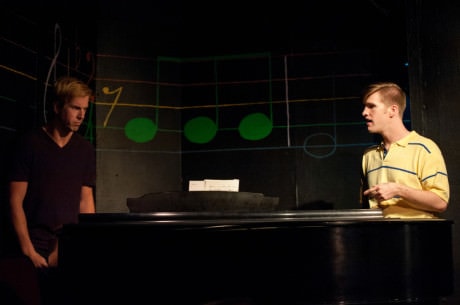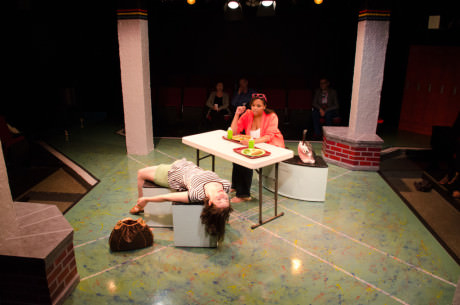Dog Sees God: Confessions of a Teenage Blockhead is the penultimate show of Spotlighters’ 53rd season and boy does it pack a punch. This unauthorized parody, written by Burt V. Royal, imagines the characters of the cartoon strip Peanuts as teenagers, dealing with sex, drugs, death, homophobia, bullying, and plenty of other horrors related to growing up and self-discovery. There are plenty of laughs, which manage to help alleviate the weightiness of the subject matter without diminishing it.

As one viewer said during Friday night’s talkback, Dog Sees God runs the risk of being gimmicky, as stereotypes and clichés abound. But in the deft hands of Director Fuzz Roark and this stellar cast, any such missteps are artfully dodged. Instead, this play gives context and heart to subjects that are often fed to us as easily ignored statistics and headlines.
Sean Dynan plays the blockhead himself, CB, who’s experiencing a crisis of identity after the death of his dog sets him questioning everything he’s taken for granted. As CB’s sister, Parker Bailey Steven is a bright spot of humanity in a show that explores the darker emotions of hate and fear. Where her brother is reliable and unchanging, she has seemingly embraced the transformative nature of adolescence, and in her own way, mirrors CB’s metamorphosis. Adam Michael Abruzzo plays Van, CB’s pothead friend and philosopher; through a haze of smoke, he may see things the clearest of all CB’s friends.
Where Steven’s character is bright, Dennis Binseel’s portrayal of Matt, a jock and CB’s best friend, is frighteningly dark. Binseel’s Matt is more sentient anger than a person, and the fear of his temper the other characters express is believable. Reed DeLisle gives an absolutely heartbreaking performance as Beethoven. April Airriona Jones and Melanie Glickman play the party girls Marcy and Tricia. And though on stage only briefly, Autumn Rocha gives a crucial and incendiary performance as Van’s sister.
Director Fuzz Roark has gone all out, using the show as a platform to jump start a larger community discussion about sexual and gender identity, bullying, and suicide. Within the program is a booklet written by Kevin Caruso, full of information about bullying, suicide, and how to identify and help people at risk. There’s even more information in the lobby, including literature on both national and local resources. But one of the best parts is the post-show talk back. The play is relatively short, only a little more than an hour and a half, and the cast is taking advantage of this extra time to hold talk backs after each performance. Here, the audience is invited to not only discuss the performance itself, but to share their thoughts on the plays’ subject matter and what can be done in their communities.
During the talkback I witnessed, some members of the audience talked about what they took away from the show. For myself, it was a renewed awareness of the importance of a human connection, of active empathy instead of passive sympathy.
Alan Zemla’s set is simple, providing a few visual homage’s to Peanuts while leaving the stage open and unencumbered for the actors. Al Ramer’s lighting is used to great effect, differentiating scene changes and emphasizing the mental and emotional states of the actors. Laura Nicholson designed the costumes, and there are lots of costume changes, many of which hearken back to the original character designs.
Ben Kinder stage managed. Melanie Glickman choreographed the fights and led Friday nights’ talkback. Devin McKay was the sound designer. Darlene Harris and Nick Fuhr are assistant stage managers, and Al Ramer and David Pritzlaff ran the light and sound board.

Dog Sees God doesn’t pretend to have any solutions, but it does provoke us to ask questions. And maybe, with more of us working together, we can find answers.
Running Time: Approximately 90 minutes, with no intermission. A talkback follows the performance.
Dog Sees God plays through June 28, 2015 at Audrey Herman Spotlighters Theatre – 817 Saint Paul Street, in Baltimore, MD. For tickets, call the box office at (410)752-1225, or purchase them online.
RATING:




